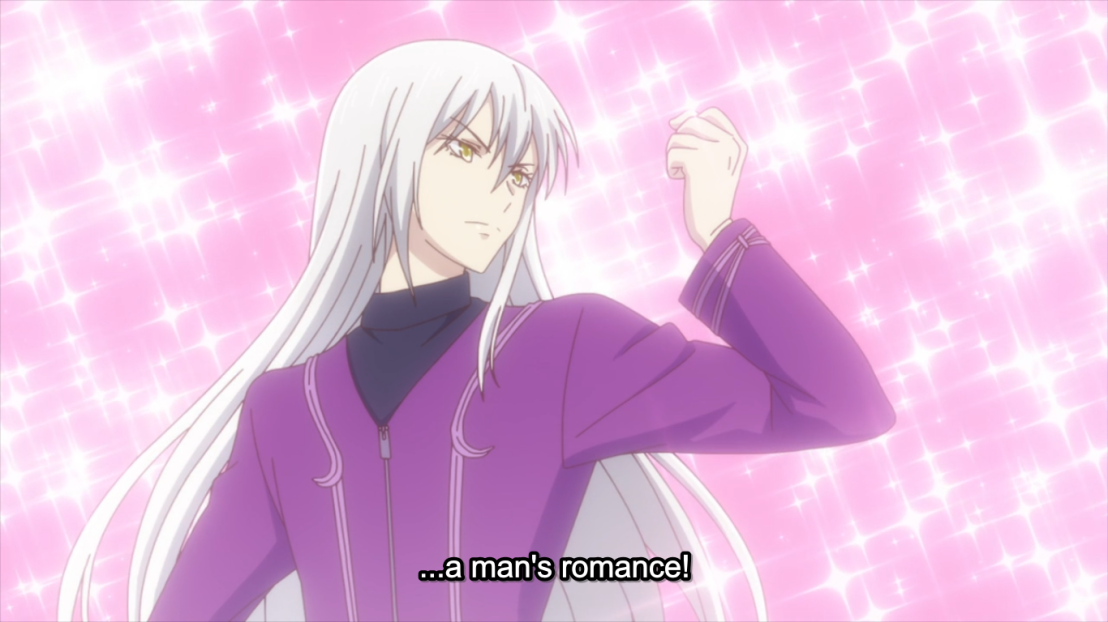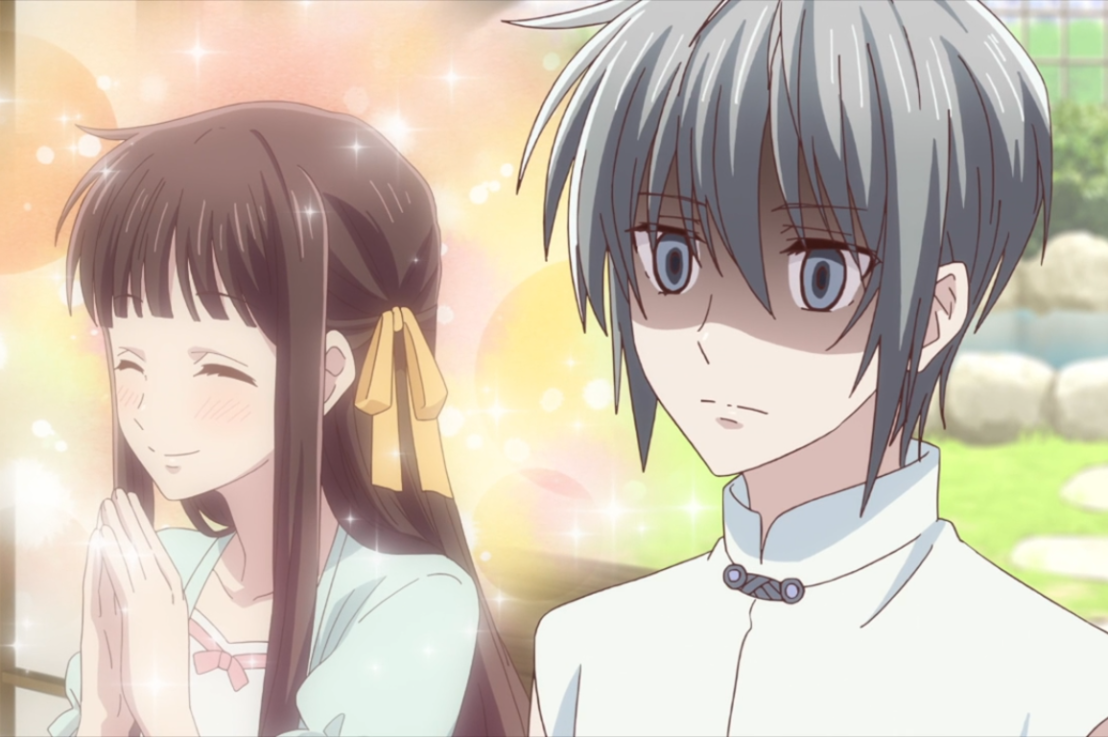The third episode of the second season of Fruits Basket backtracks to chapter 36 of the manga, in which Tohru Honda and Yuki Sohma visit Ayame’s costume boutique. That’s ten chapters before the previous episode, for those keeping track like me. The disparity between the anime and manga timelines has been apparent since Mine Kurame’s cameo in the second opening of the first season, and they’ve nearly caught up with her official introduction. “Shall We Go and Get You Changed?” adapts chapters 36 and 47, in which Yuki and Ayame discuss parent-teacher conferences, of the manga.
The combination has a lot to cover: Yuki and Tohru’s blossoming relationship, Yuki and Ayame’s shared history as well as newly forged brotherhood, and Mine’s introduction. All the while, it notably doesn’t contain a single reference to the Chinese zodiac nor the curse upon the Sohma family. With almost all the zodiac introduced and transformations no longer necessary to show their corresponding animal, Fruits Basket begins to move on from the physical effects of the curse to the psychological. In this case, we look at how brothers Yuki and Ayame fare differently as members of the zodiac.
This post contains discussion of child abuse, homophobia, and transphobia.
As with all Ayame appearances, this episode has my personal highest of highs and lowest of lows. Ayame stands out among the cast with his exuberance and poise, undeterred by the judgement of others. Like all Fruits Basket characters, that doesn’t mean he’s without feelings and hardships. Together, Yuki and Ayame have a unique position within the zodiac as the only pair of siblings. In Fruits Basket’s exploration of child abuse, Yuki and Ayame show how even siblings may not have each other for comfort under oppressive family structures. For that, which we’ll get into later, he’s one of my personal favorites.
However, Fruits Basket’s heteronormativity and casual homophobia seep through whenever Ayame shows up, which personally alienates me from a series I love. For instance, Shigure and Ayame have an inside joke of publicly flirting with and caressing each other only to disentangle and give a thumbs up. I’d rather not speculate on what these jokes mean to the characters, including the potentially bisexual Ayame (based on his declaration for everyone to lust after him regardless of gender back in high school), but their place in the story. Fruits Basket rarely acknowledges queerness, which makes the few comedic instances of same-gender affection imbalanced with the wealth of earnest heterosexual couples. It’s particularly frustrating that the anime chose to include this moment over Shigure informing Tohru that Yuki loved crabs and peaches as a child, which would provide meaning to Ayame’s seemingly random gifts. These elements shouldn’t be hand waived as “products of their time” when they’re deliberately included in a modern retelling.
Then there’s Yuki walking in on Ayame in a wedding dress, played for laughs through the surprise of a man in women’s clothing–on top of Yuki’s established distaste for cross-dressing (see: episode 6). Again, I’d rather not think about how Ayame’s comfort and Yuki’s shock illustrates differences between the brothers, but about the inclusion of cross-dressing humor. Ayame and Tohru may not judge Ayame’s male customers for ordering “women’s clothing,” but it’s still used for a gag that will become all the more uncomfortable when Fruits Basket eventually uses cross-dressing for dramatic effect.

Although Ayame acknowledges how confidentiality allows his customers to order clothing they want kept “secret,” which would include LGBTQ people, his business serves a greater heteronormative purpose. He declares the women’s costumes he sews “men’s romance,” i.e. outfits that turn men on, and that all men dream of them. This could hypothetically include men turned on by other men in such outfits, but it doesn’t acknowledge women’s attraction. There’s also Mine’s desire to dress up cute girls, but overall these loopholes and implications don’t compare to the amount of heterosexual couples in the series. Ayame proclaims men’s romance in his usual over the top manner, but it rings true in a story where every man falls in love with a woman.
Indeed, Tohru wearing an outfit from Ayame is one of the many hints at romance between her and Yuki in this episode. When Tohru steps out in her pure-white outfit, she alone appears in frame as if from Yuki’s point of view. A pink glow surrounds her to highlight her cuteness, as if noticed by Yuki. He compliments her and admits he’s glad he came if only to see her dressed up. Ayame outright calls their interaction “romance,” which embarrasses his brother. Considering Ayame’s philosophy of costumes as titillation, he and Mine no doubt anticipated the whole thing. Ayame and Mine both compare Tohru to Mine in how she cares for Yuki, which draws a parallel between the two pairs. The exact nature of Ayame and Mine’s relationship hasn’t been stated, but a flashback to Mine cradling Ayame while he’s emotionally vulnerable suggests they’re closer than the average coworkers, which implies the same for Yuki and Tohru. These hints would prove Ayame’s point about men’s romance if not for the unresolved status of the love triangle with Kyo. Still, don’t get your hopes up for Yuki to date a boy if he doesn’t win Tohru’s heart.

Yuki’s relationship with Ayame is the real meat of the episode, though. The anime’s rearranged events create some meaningful differences regarding their relationship. In the manga, Yuki visits Ayame’s shop before Mayuko announces parent-teacher conferences, which makes the events unrelated. In the anime, he decides to visit with the conference–and his future–in mind. Yuki sees Ayame running his own business far from the Sohma estate, all while he dwells on living as a tool to the Sohma family. By reaching out to his brother, he has a better idea of options for his own future. In either version Yuki discusses the conference and Ayame’s motive to create in the same conversation, but orienting them in Ayame’s shop creates a stronger link. Here, the proximity of events makes pondering his future and contacting his brother go hand-in-hand.
Yuki reaching out to his brother is one of many personal decisions he’ll have to make as he takes charge of his life, including eventually contacting his parents. Yuki knows from Tohru that people develop kindness rather than being born with it (see: episode 3), and he believes people learn to love themselves through love from others (see: episode 18). In order to change himself, Yuki starts with showing kindness by volunteering to visit Ayame’s shop. Yuki must make an effort to get to know his brother, to reach out, after being rejected the only time he tried as a child. That’s not to say he must be the one to take responsibility, but that he must make a conscious decision for their relationship to evolve. They have no innate brotherly connection, but they have fertile ground for a relationship. Yuki will develop his unique way of expressing kindness, and the two will show each other love in the process.

Ayame always showers Yuki in affection, including pressing his buttons, to make up for rejecting him in the past. The audience already knows their history of physical and emotional distance (see: episode 13), but the episode’s flashback puts their relationship in context. The episode reveals that at one point, Ayame witnessed their mother threaten Yuki with physical violence, but he neglected to intervene. The muted glimpse of teenage Ayame tearing away from young Yuki’s outstretched hand in episode 13 did not merely symbolize their severed connection, but actually occurred between them. With this scene in mind, it’s no wonder Yuki resents him and Ayame feels guilty. However, their mother is the one truly at fault for using corporal punishment and viewing Yuki as a “tool” to begin with. Ayame may have exacerbated Yuki’s isolation, but he’s unfair to himself when he compares his actions to his mother’s abuse. If not for her relinquishing Yuki to Akito and the Sohmas in exchange for money, Yuki and Ayame would have grown up together relatively normally.
Their history isn’t the only obstacle Ayame and Yuki have to reconciliation. As their squabbles over costumes and romance illustrate, they have opposing attitudes that led to petty disagreements. Ayame describes himself as being “born having what you lack,” but they more accurately have developed inverted dispositions. While Ayame is expressive on the outside and aloof on the inside, Yuki is vice versa. The more they interact, the more Ayame feels for Yuki and the more Yuki betrays his “princely” demeanor, which breaks down these dichotomies. The anime’s fusion of manga chapters aids this by blending two conversations, one in which the brothers admit they’re incompatible and another in which they find common ground, which results in connecting despite their differences. Indeed, the episode ends on young Ayame opening the door to Yuki’s isolated room and assuring him he’ll no longer be alone. By reaching out to Yuki now, Ayame has the same impact as if he had reached out then, according to the dim lighting and coloring borrowed from flashbacks. By opening the door, Ayame literally lets light into Yuki’s life.
Apologies for the delay on this post. As I wrote on Twitter, I devoted too much of my energy to breaking down the cisheteronormativity at play and ended up emotionally exhausted. I hope my end result is even-handed. More importantly, double apologies for not discussing Mine more. I truly love her and Ayame together. I plan to skip “I Got Dumped” and move onto the next episode. See you then!
